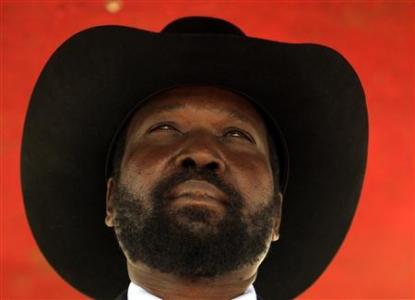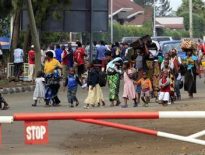(Reuters) – Deng Athuai Mawiir knows about the dangers of fighting the corruption that helps glue this young country together.

In early June a letter by President Salva Kiir, asking some 75 ministers and officials to return $4 billion of stolen government money, leaked to the press.
Mawiir, a human rights activist, marched on parliament with a few dozen fellow activists calling on the president to publish the names of those suspected of the theft.
A few weeks later, on the evening of July 4, Mawiir was leaving a hotel in Juba, South Sudan’s small and sluggish capital, when a dark green SUV pulled up. An unknown man offered him a lift and when Mawiir stepped into the vehicle, someone pulled a bag over his head and tied his hands together, Mawiir said.
What happened over the following two days underscores the size of the challenge that faces not just Kiir and his anticorruption push, but South Sudan’s attempt to build itself from scratch.
Just 16 months after breaking away from its old masters in Khartoum, South Sudan seems caught between principles and pragmatism.
The rulers of the world’s newest nation – which Reuters is chronicling in a series of articles to assess whether it will flourish or struggle – have fostered a system of patronage and rewards to provide short-term stability in this vast and ethnically diverse country. But that has fuelled rampant corruption that undermines the stated ideals of the country’s liberators and its foreign backers.
South Sudan’s charismatic liberation hero John Garang often warned against replacing one set of kleptocratic rulers for another. But Garang didn’t live to see independence and Kiir, his successor, has struggled to exert the same kind of moral leadership. Where Garang was a forceful rebel leader intolerant of dissent, Kiir’s approach has rested on a careful accommodation and assimilation of ethnic and political rivals.
He has appointed loyalists to some positions. But to maintain peace and ensure the independence vote went ahead early last year, he has also given potential trouble-makers senior posts in the government and the security services.
At times they have made him look powerless, unable to counter what can be an overweening sense of entitlement among his own ministers and officials, a ruling elite made up of former exiles and of civil war veterans now determined to enjoy the trappings of power.
It is still not clear who kidnapped Mawiir.
The government has denied any link and the Ministry of Justice said it would not discuss its investigation of the kidnapping.
But four months on, sitting on a plastic garden chair on a bank of the Nile, Mawiir said he suspects his captors are linked to senior officials angry with his calls for transparency. His colleagues have received anonymous threats demanding they stop talking about corruption.
Mawiir’s kidnappers took him to a dark room, tied him to a chair and interrogated him for two days, he said. They denied him food and water. They slapped and kicked him.
“They said, ‘You are talking everywhere about corruption? Who sent you to us? Where were you when we were fighting?'” Mawiir told Reuters a few days after his release. They urged him to tell the truth, he said, or he would be killed.
After two days he was driven out of town and across the Nile, where he was frog-marched along a path with the bag on his head, his hands tied and a gag in his mouth. Feeling long grass brush his arms, he assumed he was being taken to a quiet spot to be killed.
When he heard people approaching, he tried to make a noise and his kidnappers fled. Mawiir rubbed his head against a tree, ripped a small eye-hole in the bag and managed to walk to a nearby village and freedom.
Today, Mawiir is undeterred and continues to press for the government to name the corrupt officials. He faces formidable odds.
EXPATS AND WARRIORS
The land that Kiir and his chiefs rule is oil-rich but laid to waste by decades of warfare and economic neglect.
Life expectancy is less than 50. Just a quarter of people can read. A young girl is three times more likely to die in pregnancy or childbirth than still be in school aged 14, according to the United Nations.
When he first took charge after Garang died in a helicopter crash in July 2005, Kiir, who declined to be interviewed for this story, moved to shore up his own position and ensure security. South Sudan had just won a measure of autonomy from Khartoum in a peace deal but if the would-be nation was to have a chance at independence, Kiir needed to keep the peace.
Kiir built a big tent, bringing in members of the diaspora, many of them educated abroad and wanting to help build their homeland, as well as battle-hardened veterans. For instance, the Minister of Roads and Bridges – charged with building a road network to cover a territory the size of France – used to lead rebel efforts to mine roads and dynamite bridges.
Former enemies of the ruling Sudan People’s Liberation Movement were also handed key positions. One-time foe Riak Machar, for instance, became vice president.
Sitting behind a large wooden desk in the parliament building, SPLM elder Wanni Igga, who stepped aside to make way for Machar, explained the need for compromise. “If we did not put Dr Riak in a top position, he might not have agreed to reconcile and we (would have) continued to fight ourselves.”
While the new leaders know guerrilla warfare, they have no experience of running a country. One minister described governance as tougher than fighting.
With no functioning welfare system and few private jobs, the government has created thousands of positions simply to give people work, according to one official. The result is a bloated civil service stuffed with workers who lack the skills and ability to run the world’s youngest nation.
Over breakfast at one of Juba’s $300-per-night hotels, thrown up quickly and made from metal shipping containers or prefabricated cabins, Deputy Defence Minister Majak D’Agoot, a doctor of economics, was frank about the government’s hiring.
“Look at the landscape of the warlords that we have absorbed, without applying stringent criteria, in the interests of the peace. That buy-in was necessary,” D’Agoot said.
“When you recruit people for the political party there are criteria that qualify them for leadership positions. They are not necessarily the same qualifications that make them suitable for a rebel organization whose main mission is fighting.”
“PLEASE ONLY STEAL A MILLION”
Too often, the result is mismanagement and graft.
On a door in the Information Ministry, a “Polite Notice” informs visitors “that the office of the Deputy Minister does not provide financial support or give money handouts. Thank you for your understanding.”
Such requests are not all that surprising. Under the terms of the 2005 peace deal, 50 percent of Sudan’s petrodollars started flowing south, swamping the nascent nation of South Sudan with cash.
Some $13 billion on, and now fully independent, Juba is cluttered with ostentatious off-road vehicles. Shiny multi-story buildings are sprouting above the tree-line. But the rest of the country has little to show for its underground treasure.
Critics of the government say the majority of the country’s 8.6 million people have yet to benefit from secession. Lam Akol, a prominent defector from the ruling SPLM, heads the largest opposition party and believes Kiir’s system of patronage and cronyism is already destroying the nation.
“The money was squandered in Juba and the population saw nothing of it in terms of basic services and improved security,” Akol wrote in a July opinion piece. “The huge government in South Sudan is not by accident, it is a reflection of the distribution of patronage and clientelism in the ruling party.”
The government regularly accuses Akol of links to a Khartoum-backed militia. Akol denies any such connection.
With no financial systems in place and nobody with experience of civilian rule at the helm, Kiir’s apparatchiks have often run the country as they did their military units, with little accountability.
“There was so much money at the beginning that losing a million here or there wasn’t so bad. There was a joke that if you’re going to steal money, please only steal a million,” said Jok Madut Jok, South Sudan’s undersecretary of culture.
Greed is only part of the story. Jok believes many veterans felt a sense of entitlement. In the first few years after the peace deal, there was also a commonly held view that Khartoum would never allow secession to go ahead. Fearing they would be forced to swap their briefcases for ammunition boxes, many took what they could get.
The attitude was, “‘I’ve fought for 30 years in the bush … I’ve got to get all I can if the war restarts and have to set up my family,'” Jok said.
Transparency watchdog Global Witness says that based on the government’s own figures, more than 30 percent of all oil revenue since semi-autonomy in 2005 has been stolen.
The head of South Sudan’s Anti-Corruption Commission, Justice John Gatwech Lul, describes the first few years after the peace deal as a “no man’s land.”
“We started from zero,” said Lul. “There were no ministries and no laws. There was no system. There were no financial forms to restrict you from using money for whatever.”
Even now, Lul told Reuters, Juba lacks the ability to pursue and prosecute those suspected of corruption.
“GOATS ON THE PAYROLL”
At the National Audit Chamber the extent of the country’s financial mismanagement is obvious.
Auditor General Stephen Wondu’s 2007 report – the 2007 and 2008 reports were released just this year – says $114 million in oil revenue went missing, enough to import 3,800 heavy duty tractors. The Ministry of Education’s “weekend allowance” was equal to the monthly salaries of 855 teachers. The Ministry of Health’s cash hoard of 3.3 million Sudanese pounds ($1.1 million) could have met the annual salaries of 282 university graduate nurses.
Wondu sees such transgressions as almost inevitable given the situation in which the rebels found themselves in 2005. The government inherited a state without financial and accounting systems, a predatory economy where the budget had been used to buy people off.
“There were even goats on the payroll,” he quipped. “This created an environment conducive for temptation, a human weakness. Temptation, it’s embedded in all of us. What comes out is the circumstances that surround us.”
South Sudanese, he said, were like the Jews who wandered the desert for years before better times came. “The only difference was that we had grass to eat and dirty water to drink, then suddenly $2 billion came not from the sky but from the ground.”
He covered his face with his hands.
“Unfortunately for humanity, we are no exception – except that we had no systems that can deal with these deviations.”
In the best-known case of graft, the “dura saga,” the government awarded contracts to import 7 billion Sudanese pounds (around $2.3 billion) to build a strategic grain reserve of sorghum, or dura, as the country’s staple crop is known. The companies who won contracts were unregistered and not able to deliver the ordered quantities, the 2008 auditor’s report revealed. Few of the grain stores were ever built and most of the dura never arrived.
Although not all the contracts were paid, several hundred million dollars were frittered away, one insider who worked at the ministry of finance at the time told Reuters.
None of the companies were punished.
Garang seemed to anticipate the problem of corruption. A video taken during the war years and recently posted on South Sudanese website PaanLuel Wel shows the rebel leader haranguing his guerrilla forces that a liberation movement must help everyone and that corruption could ruin things. “There is no meaning of revolution, unless it makes our people happy,” Garang says, carrying a leader’s swagger stick. “Unless the barest of things are not available to people, then the people will drive us into the sea.”
Kiir’s letter to his officials was a sign that the new president still shares the sentiments of his predecessor.
“We fought for freedom, justice and equality,” Kiir wrote. “Many of our friends died to achieve these objectives. Yet, once we got to power, we forgot what we fought for and began to enrich ourselves at the expense of our people.
“The credibility of our government is on the line.”
HEROES MONUMENT
In many ways, corruption and nepotism hold South Sudan together.
Many Sudanese have long believed that the Dinka, who make up some 40 percent of the population, dominate to the detriment of other groups.
Kiir, a Dinka like Garang, is credited with making a major effort to build a diverse cabinet. Vice-President Machar and James Hoth Mai, the head of South Sudan’s army, are Nuer. Pagan Amum, Secretary General of the SPLM and South Sudan’s chief negotiator with Khartoum, is Shilluk.
But even with this careful ethnic balancing act, the perception of a “Dinkocracy” persists.
A March 2012 report by the Washington-based National Democratic Institute for International Affairs which drew heavily on the opinions of ordinary South Sudanese found that “Tribalism in government work is pervasive … even though often denied.”
In his office, Jok, the culture undersecretary, explains another way the rivalries hurt the new nation.
Four Korean-made plaster of Paris models submitted for his review as potential memorials to the war that killed some two million people lined a shelf. One showed a giant assault rifle bursting from the earth with “FREEDOM” written down the barrel.
Another had a giant slab of jagged rock with the chiseled inscription, “To the Fallen Heroes and Heroines,” set behind a soldier cradling the body of an injured comrade.
Jok, who worked for aid group Save the Children during the war, said he hated the models. A statue commemorating the war – long a unifying force for South Sudan’s 70 tribes – should glorify everyone, not just fighters from the Sudan People’s Liberation Army, he said.
“Exclusionary policies are the death knell of a country like ours. Those who feel marginalized will use a gun to get their piece of the pie.”
ATTITUDE OF DEFIANCE
Despite violent flare-ups in some parts of the country, the government has so far papered over splits by focusing on the old enemy in Khartoum. Its January decision to stop oil production and later to send in troops to Heglig, a disputed border area, both helped rally the nation.
In the government ministries complex, a collection of two-storey buildings flanked by dust-blanketed roads, a billboard proclaims “Forgive them, Oh Lord, All the Oppressors” – an apparent reference to the Khartoum government.
Ministers and other officials still regularly use the word “war” in relation to Khartoum.
“In fact we are still in a state of war … for 54 years, we have been like this,” said Jacob Aligo, Minister of Finance and Economic Development for Central Equatoria State, as he justified the government’s decision to shut oil output.
“It is better for us to suffer for a bit, than to be enjoying (life) in humiliation,” said Aligo, advocating a spirit of sacrifice constantly evoked by South Sudan’s military and political elite.
When it comes to those officials themselves, though, it’s a different story. Just days after the government announced belt-tightening measures in May, ministries took delivery of another batch of gleaming luxury SUVs, according to diplomats and aid officials in Juba.
Privately, some senior members of the foreign development community in South Sudan question the ability of Kiir and his cabinet.
“This is not a revolutionary movement that has taken power, this is a rag-tag bunch of boys with guns that have never administered anything,” said one senior development official, who asked not to be named.
A government insider, speaking at an isolated hotel lodge in the shadow of Juba’s craggy “Jebel Kujur” hill, said it was the international community and its myriad aid agencies and development consultants who really run South Sudan.
Ministries are full of advisers. It was the international community, the source said, who recommended the government offer high salaries and perks to tempt educated members of the diaspora home.
The country’s diplomatic naiveté is now eroding its friendships. The position of the SPLM, for years a darling of many donors, may be slipping. Kiir’s decision to turn off the oil without telling his western backers infuriated them. When he sent troops into Heglig it drew the first censure of the new government from the United Nations.
“Heglig blew it for them … the Americans were pissed,” one foreign development expert said.
“A CULTURE OF IMPUNITY”
Some government officials give the impression of earnest commitment and interest in their tasks, which by any measure are huge.
The Ministry of Roads and Bridges has an ambitious plan to team up with foreign partners to build a network of 3,000 km (1,800 miles) of tarmac roads in five years.
“Roads are No. 1, the top priority,” says Deputy Roads and Bridges Minister Simon Mijok, showing off a map of South Sudan with Chinese characters scribbled in pencil above local place names – symbols of the hope the newly independent nation has placed in its powerful Asian economic backer.
“I was a lecturer in history at the University of Juba, I’m now lecturing in the history of roads,” he said with a wry smile.
Contrary to mainstream development thinking, such challenges may be best met by turning a blind eye to corruption, some argue.
Chris Blattman, assistant professor of political science at New York-based Columbia University, believes Western governments and aid groups focus too much on corruption, giving it unhelpful prominence over issues such as political stability and property rights.
“How do you hold a country together? Either with inclusive and representative institutions, or by repression, or through patronage. South Sudan will develop these institutions over 10, 20, 30, 40 or 50 years,” Blattman said.
“In the meantime, they can either be thugs or repressive or violent, or they can use a little patronage – and I’d prefer the latter over the former.”
But others say that to maintain stability South Sudan’s leaders need to become more accountable.
Days after human rights campaigner Mawiir was released, beaten but alive, his colleagues received death threats by text message and by phone.
Ateny Wek, spokesman for the Civil Society Alliance, said he was threatened with the same treatment as Mawiir unless he stopped his regular columns in local newspapers. He has kept writing.
“There has been a culture of impunity since the creation of southern Sudan,” Wek said. “Some people have lived, and continue to live, above the law.”
Like many other liberation movements across the continent, the SPLM risks losing support if it doesn’t reform, said speaker of Parliament Igga.
If people “see us as not fighting corruption with all our teeth and nails in a genuine manner, we might allow other political parties to capture power,” Igga said.
“We can keep the militias at bay with our army. But you cannot keep the whole population at bay.”
(Edited by Simon Robinson)





